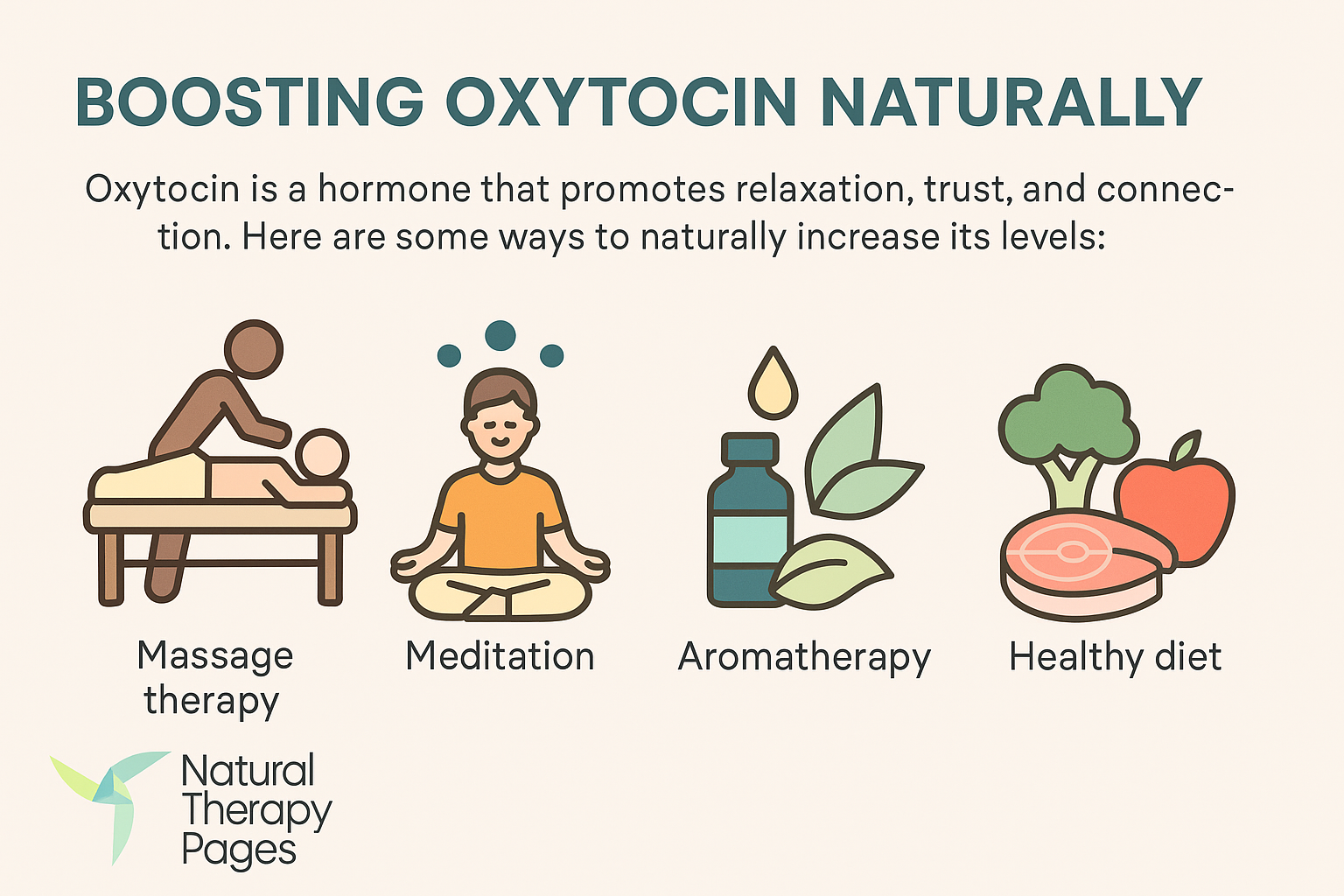
We often hear about serotonin, dopamine and even endorphins when talking about mental health and emotional balance. But oxytocin? That’s the unsung hero of the feel-good hormone family. Often referred to as the “love hormone” or “cuddle chemical,” oxytocin is more than just something that kicks in when you’re hugging a loved one or bonding with your baby.
This article explores how oxytocin works and how natural therapies can help increase its production—improving emotional healing, reducing pain, lowering stress and enhancing overall wellbeing. No medication required. Just a bit of time, intention, and connection.
What is oxytocin and what does it do?
Oxytocin is a hormone and neurotransmitter produced in the hypothalamus and secreted by the pituitary gland. It’s best known for its role in childbirth and breastfeeding, but research has revealed its broader involvement in emotional regulation, pain relief, and social bonding.
When oxytocin is released—whether through a hug, a meaningful conversation, or simply connecting with nature—it can:
-
Reduce cortisol (your stress hormone)
-
Promote a sense of calm and trust
-
Improve sleep and digestion
-
Ease emotional tension
-
Help regulate blood pressure
-
Encourage feelings of safety and connection
In short, it’s your body’s own way of saying, “You’re okay. You’re safe. You belong.”
The role of oxytocin in natural therapy

Natural therapies focus on stimulating the body’s healing abilities. That’s where oxytocin comes in. Many popular and evidence-based natural practices work, in part, by triggering oxytocin release. Let’s break down how they do it.
Massage therapy
Massage is one of the most effective ways to stimulate oxytocin. Through skin-to-skin contact and rhythmic pressure, your body’s parasympathetic system kicks in, slowing your heart rate and increasing oxytocin production. This isn’t just relaxing—it’s biologically therapeutic.
One Australian review found that massage therapy significantly reduces cortisol and increases oxytocin levels, particularly when the massage is done regularly by someone the recipient trusts. Whether it's a full-body treatment or a simple back rub at home, therapeutic touch fosters connection and healing.
Meditation and mindfulness
Stillness might not seem exciting, but it’s incredibly powerful. Regular mindfulness practice helps reduce stress, increase emotional awareness, and, yes—raise oxytocin levels. When you’re calm and present, your nervous system gets the message that it’s safe to open up and connect.
In fact, research shows that people who practice mindfulness for just a few weeks report greater feelings of empathy and connection—classic oxytocin effects. Try guided meditation apps or mindfulness-based stress reduction (MBSR) techniques if you’re unsure where to start.
Aromatherapy
Your nose knows. Essential oils like lavender, ylang ylang, rose and clary sage have been shown to affect the brain's limbic system and stimulate oxytocin release. One Japanese study even found that certain calming scents elevated salivary oxytocin levels in stressed participants.
Aromatherapy isn’t just about pretty smells—it’s a powerful emotional reset. Try diffusing calming oils during your bedtime routine or using them during massage or yoga.
Acupuncture
In Traditional Chinese Medicine, acupuncture is thought to restore energy flow and balance. In Western terms, acupuncture stimulates nerve pathways and can trigger oxytocin release. Studies suggest it may help manage pain, especially in conditions like migraines or arthritis, by engaging oxytocin’s natural analgesic effects.
If you’re already seeing an acupuncturist, ask about points that support emotional regulation and relaxation.
Foods and nutrients that help oxytocin thrive
Believe it or not, what you eat can also influence oxytocin levels. Certain nutrients support hormone regulation, while others act as building blocks for neurotransmitters.
Here’s a quick list of oxytocin-supporting foods:
-
Eggs and dairy: High in tryptophan, essential for oxytocin production
-
Salmon and fatty fish: Packed with omega-3s that support brain health and oxytocin activity
-
Dark chocolate: Encourages dopamine and serotonin, which work in tandem with oxytocin
-
Green leafy veg: Rich in magnesium and B vitamins—crucial for hormonal balance
-
Nuts and seeds: Brazil nuts, in particular, offer selenium which supports thyroid health and oxytocin function
Try to eat meals in a relaxed setting and enjoy your food slowly—oxytocin is just as much about the experience as the ingredients.
Other surprising ways to boost oxytocin
Sometimes, the simplest actions have the biggest hormonal benefits. Here are a few under-the-radar habits that naturally encourage oxytocin release:
-
Laugh more: Whether it’s a funny film or a mate with a great sense of humour, laughter increases oxytocin and reduces stress.
-
Spend time with pets: Stroking a dog or cat for just 5 minutes can raise your oxytocin levels—both yours and theirs.
-
Take cold showers: Brief cold exposure may stimulate the hypothalamus, where oxytocin is made.
-
Practice gratitude: Keeping a gratitude journal has been linked to improved wellbeing and oxytocin levels.
-
Sing or dance: Group singing or dancing promotes unity and elevates mood, helping oxytocin flow freely.
These activities are free, accessible, and effective—try adding a few into your routine this week.
Why social connection matters more than ever
Oxytocin is sometimes called the “bonding hormone” for a reason. It strengthens our sense of community, emotional resilience, and ability to support one another. In an increasingly digital world, taking time for real human interaction is one of the healthiest things you can do.
Natural therapies that centre around community—like group yoga, group therapy or even laughter clubs—can help us feel seen and supported. Horticultural therapy is another gentle way to encourage oxytocin release by connecting with nature, nurturing plants, and reducing feelings of isolation.
As humans, we’re wired to connect. Oxytocin simply gives us the nudge we need.
The science behind the benefits
Modern research backs up what natural therapists have long observed—that increasing oxytocin can improve both mental and physical health.
Recent studies have found that:
-
Oxytocin reduces inflammation and may support immune health
-
Higher levels of oxytocin are linked to lower blood pressure and reduced risk of cardiovascular events
-
Oxytocin can help reduce pain perception, especially in people with chronic conditions
-
Emotional resilience improves when oxytocin is present, helping people handle stress and emotional challenges more easily
You can explore more Australian-based studies on natural therapies and emotional health through Healthdirect or the Australian Natural Therapists Association.
Wrapping up
You don’t need a lab coat or a prescription to increase oxytocin—you just need a little awareness and a willingness to slow down and connect.
Whether you’re easing pain with acupuncture, finding peace through meditation, or simply enjoying a heartfelt chat over tea, you're engaging with one of your body’s most powerful healing tools. Oxytocin is there, working quietly in the background, nudging you toward balance and belonging.
If you’re curious about incorporating more natural therapies into your life, it’s worth speaking to a qualified natural health practitioner near you. You might be surprised by how much healing starts with a little trust, a touch of kindness, and the natural power of your own body.









